Conference
- INTERNATIONAL RESEARCH CONFERENCE (MARCH 2025)
- UNIVERSAL AI UNIVERSITY INTERNATIONAL RESEARCH CONFERENCE (MARCH 2024)
- INTERNATIONAL CASE STUDY CONFERENCE (NOV 2024)
- AI FOR A SUSTAINABLE FUTURE (Mar 2023)
- GREEN ECONOMY A NECESSITY FOR SUSTAINABLE FUTURE (Mar 2022)
- ECONOMICS OF SUSTAINABILITY (NOV 2022)
- INTERNATIONAL CASE STUDY CONFERENCE (Nov 2021)
- INTERNATIONAL CASE STUDY WRITING WORKSHOP (Jun 2021)
- REINVIGORATING BUSINESSES POST COVID-19 (MAR 2021)
- INTERNATIONAL CASE STUDY WRITING WORKSHOP (Sept 2020)
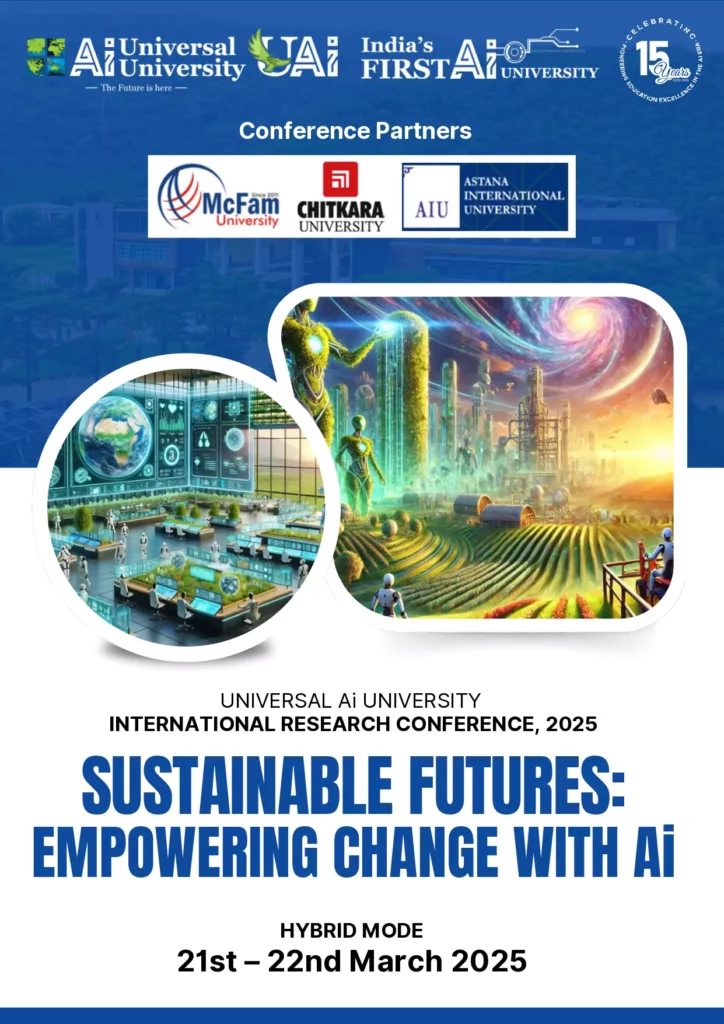
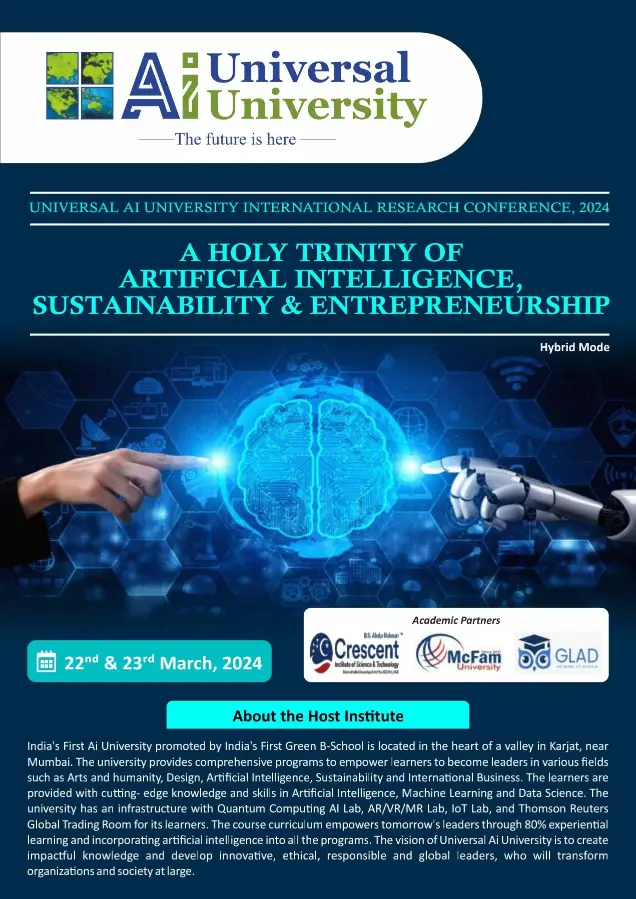
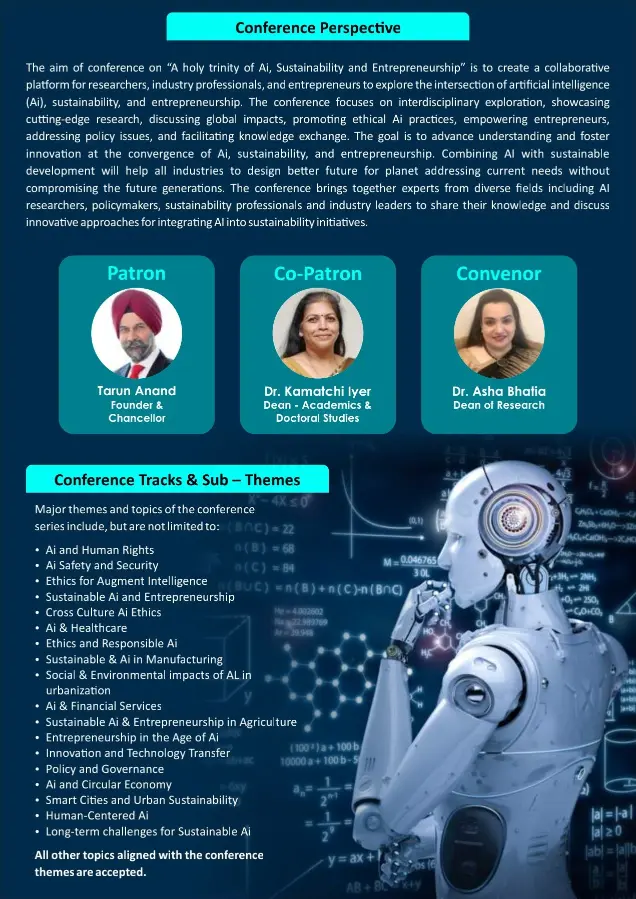
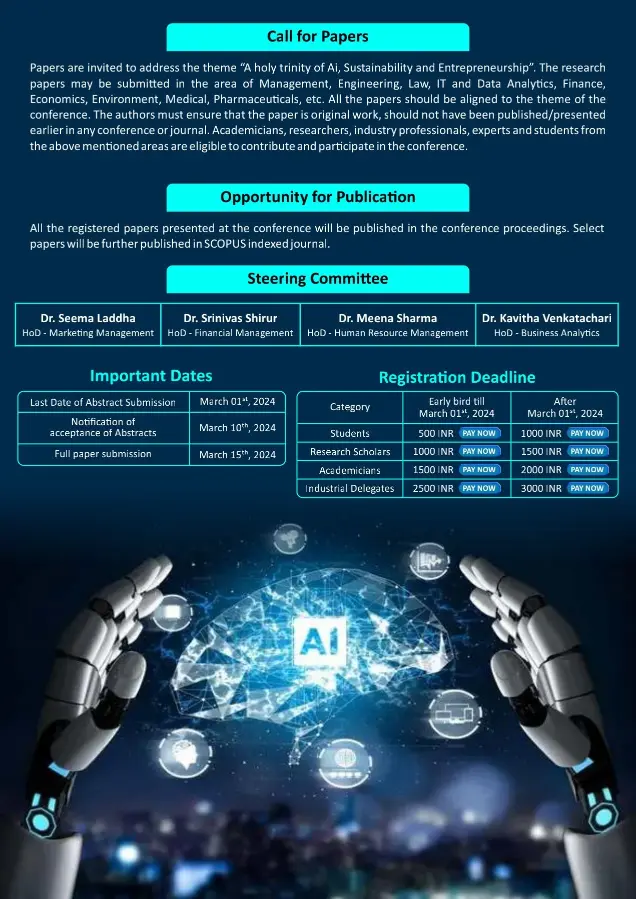
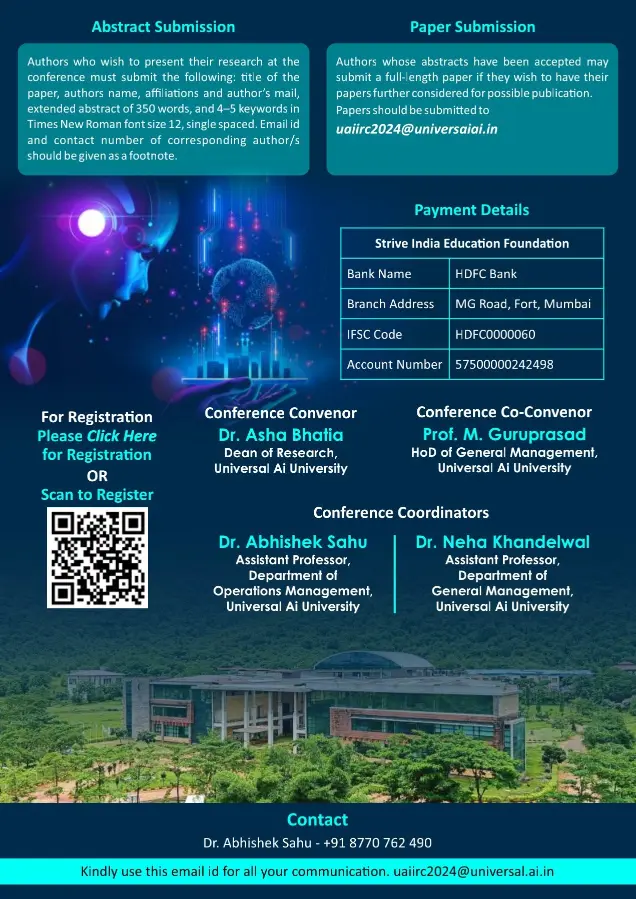
Step 1 :
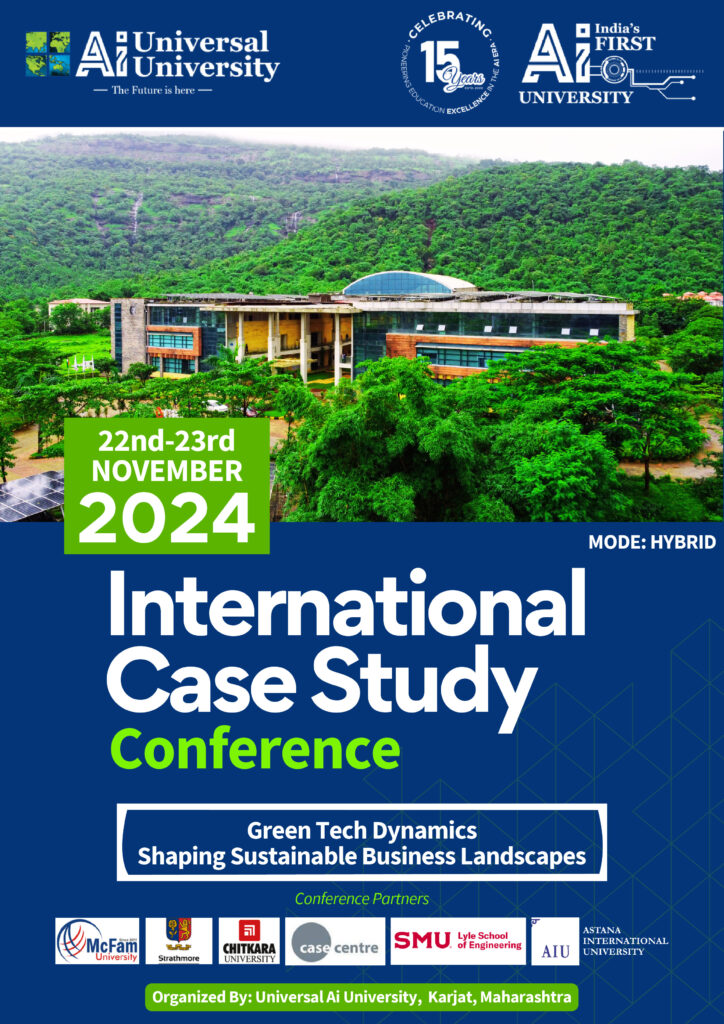
Step 2 :
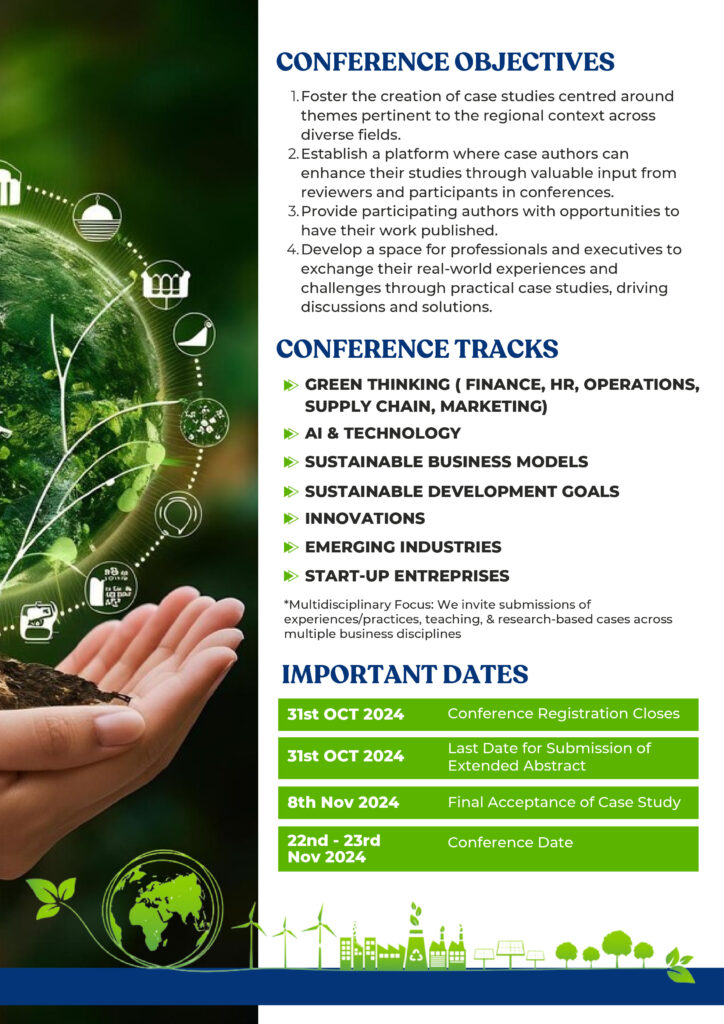
Step 3 :
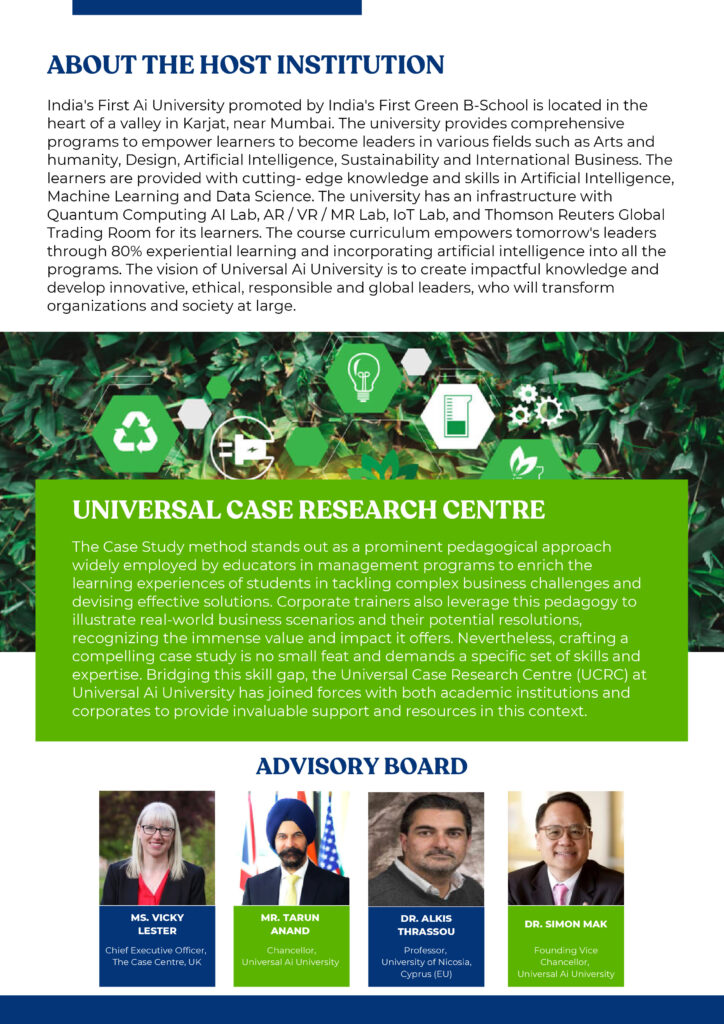
Step 4 :
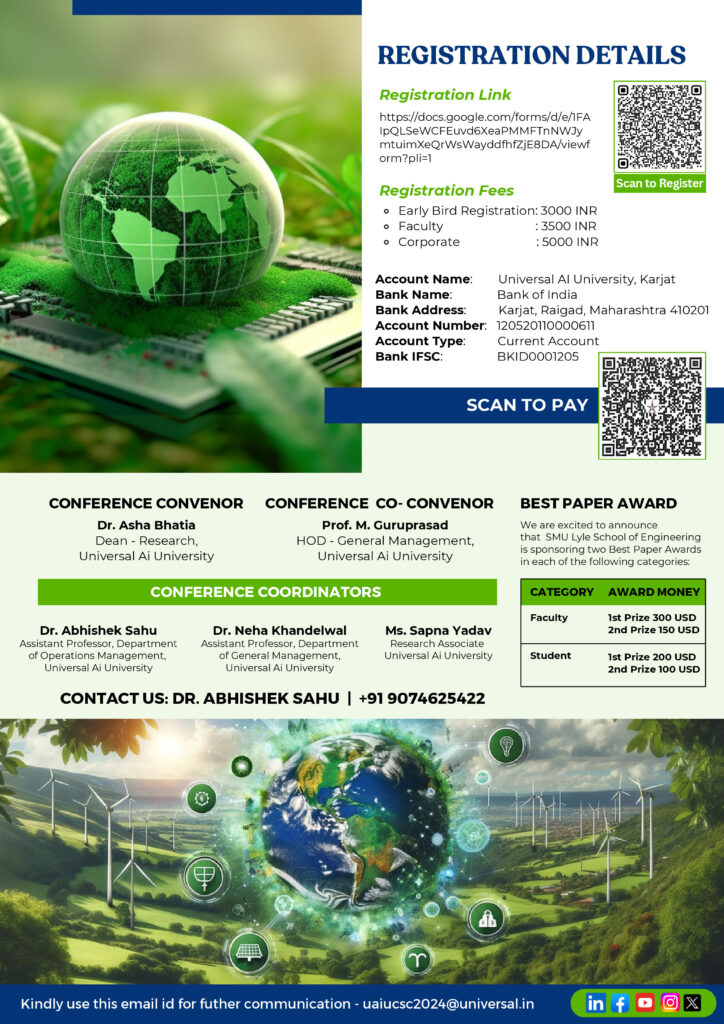
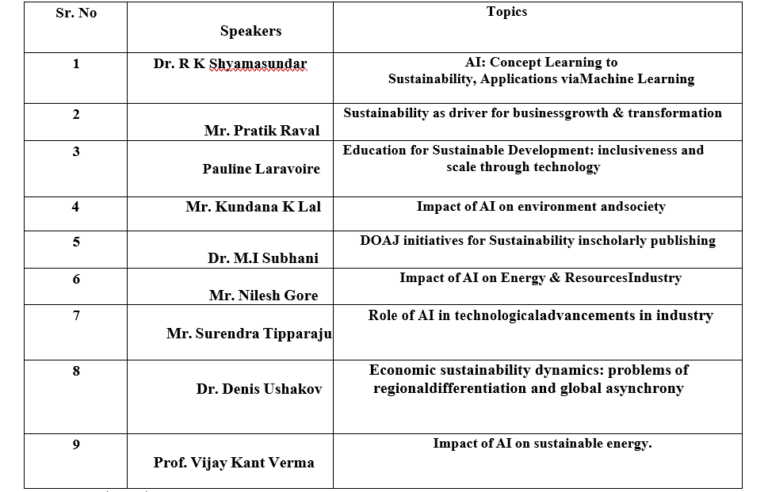
Glimpses of Conference
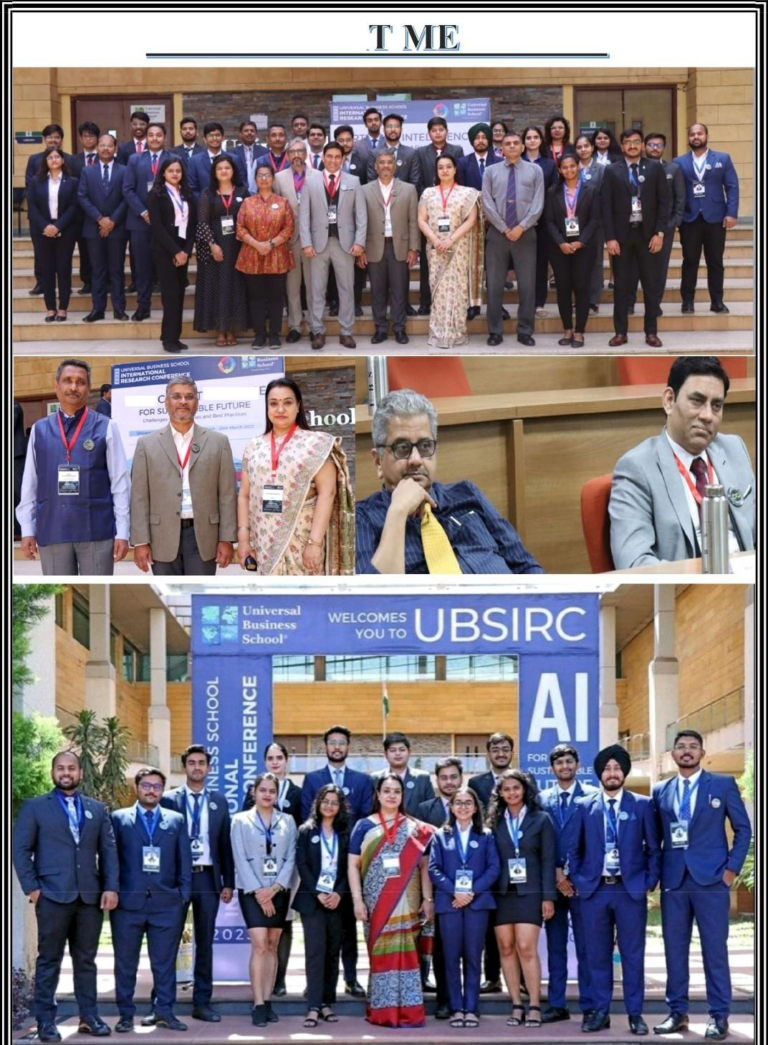
University AI University (formerly Universal Business School) hosted an international conference from 24 th – 26 th March 2022. The international Conference was organized by Universal Business School, Karjat, Maharashtra.
Day 1 Date: 24th March, 2022 Time: 10.00AM -13.00PM Title: Pre-Conference Workshop
Conducted by: Dr. Ajay Kumar Chauhan, Director – FPM, Universal Business School
Theme: “High Quality Research Paper Writing Tips” Description: In this important workshop Dr Ajay Kumar Chauhan highlighted the need of publishing good quality papers in high end impact journals. Dr. Chauhan provided an insightful discussion on topic selection, research analysis methods and journal selection for potential publications. He also shared various tips on how to publish in top listed journals.
Day 2 Session 1: Inauguration Date: 25th March, 2022 Time: 9:30AM to 10:00AM Title: Inauguration session
Description: The conference was inaugurated and opened for the two days detailed discussions on various topics by Prof Tarun Anand, Chairman, Universal Business School along with Prof Asha Bhatia, Director, Research Universal Business School. The participants were deliberated on conference themes by Prof Asha Bhatia.
Session 2: Plenary Session Time: 10:00 to 10:30AM Theme: Transitions to Net Zero in a Green Economy
Description: Prof Narula discussed about the role of corporate houses towards building the green economy. She highlighted the need of transitioning towards net zero and provided an insightful discussion on various means and interventions of doing it. Dr Narula in her address also stressed upon role of educational institutions, society, NGOs, Government and corporates in achieving the Net Zero Transitions set forth by honourable Prime Minister at recently held COP-26 at Glasgow.
Session 3: Distinguished Lecture Time: 10.30AM-11:00AM
Theme: “Impact of environmental management systems on corporate performance”
Description: The speaker gave detailed insights on how Environmental management systems are essential for companies. Dr Denis highlighted that EMS embody data collection, reporting, performance measurement, and tools. At present, most environmental management systems are implemented using a separate, formal department that is responsible for this aspect of corporate performance. They also tend to focus on tactical and operational problems. Their stance is primarily reactive. That is, in most firms, these systems come into play once a problem has occurred. They are also driven by environmental regulations. Dr Denis concluded that EMS are internally oriented, with relatively little attention being devoted to environmental problems within the supply chain.
Session 3: Distinguished Lecture Time: 10.30AM-11:00AM
Theme: “Impact of environmental management systems on corporate performance”
Description: The speaker gave detailed insights on how Environmental management systems are essential for companies. Dr Denis highlighted that EMS embody data collection, reporting, performance measurement, and tools. At present, most environmental management systems are implemented using a separate, formal department that is responsible for this aspect of corporate performance. They also tend to focus on tactical and operational problems. Their stance is primarily reactive. That is, in most firms, these systems come into play once a problem has occurred. They are also driven by environmental regulations. Dr Denis concluded that EMS are internally oriented, with relatively little attention being devoted to environmental problems within the supply chain.
Session 4: Distinguished Lecture Time: 11:00AM-11.30AM
Distinguished Speaker: Dr. M. I. Subhani, Dean, Business School, ILMA University, Pakistan. Senior Ambassador, DOAJ.Thomson Reuters Award Winning Editor, Education Committee Member, Society for Scholarly Publishing- SSP, USA Member Creative Common GN.Member of Research Data Publishing Ethics, Force 11
Theme: “Role of DOAJ in Scholarly Communication for Sustainable Future”
Description: Dr Subhani highlighted that all research results whether scientific, technological, social sciences or humanities, culminate in their reporting or publishing for subsequent use by the society. The speakers further highlighted that the research output is the intellect, scholarship, the sweat and toil of the scientific community or the researchers and it needs to be published for the researchers and for the societal benefit. Dr Subhani further laid stress for open access publishing, as it will be helpful for academicians, researchers, students and policy makers.
Day 1: Parallel Session-1 Time: 11.45 AM- 12:30 PM
Theme: General Management
Session Chairs: Dr. Waheeda Thomas, Prof Guruprasad Muthuseshan
Day 1: Parallel Session-2
Time: Technological Innovation Theme: Technological Innovation
Session Chairs: Dr. Tapas Sengupta and Prof. Chandravadan Prajapati
Day 1: Parallel Session-3 Time: 13:30PM-16:30PM
Theme: Marketing
Session Chairs: Dr. Dilip Nandkeolyar, Dr. Karunakar Jha
Day 1- Parallel Session 4 Time: 13:30 PM – 16:30PM
Theme: Human Resource
Session Chairs: Dr. Pranjali Madhur and Dr. Indrajit Goswami
DAY 3 Session 1
Date: 26th March, 2022 Time: 9:00AM-9.30AM
Theme: “Social Drivers of Sustainable Development”
Description: In this session Prof Merek highlighted the evolution of sustainability and how sustainable development goals came into being and how SDGs surpassed millennium development goals for universality, integration and partnerships. Prof Merek further highlighted the ways of preaching and adopting sustainability in our daily lives for the betterment of our mother planet and for future generations. Prof Wosinski in his address also showed participants the cross cultural diversity and its role in creating peace and prosperity across the globe.
Session 2 Time: 9.30AM- 10:00AM
Theme: “Green Accounting and Finance: its Relevance in Sustainable Future”
Description: Dr Faozi provided detailed insights on topic green accounting and highlighted that before green accounting we should know about green finance , carbon accounting. Further Dr Faozi highlighted that In green accounting we consider sustainability accounting, he further added there is no single definition for green finance. Dr Faozi further added that green growth will come from applying green public procurement and green research and development. Appropriate penalties such as making the polluter pay for pollution and incentives like tax breaks for investment in green R&D are required. However, measuring green growth will need additional criteria such as sustainability, greenness, happiness or well-being.
Day 3: Parallel Session-1 Time: 11.00AM- 13:00PM
Theme: Operation
Session Chairs: Dr. Ajay Jha and Prof Ajay Singh
Day 3: Parallel Session-2 Time: 11.00AM- 13:00PM
Theme: Finance
Session Chairs: Dr. Ayesha Siddiqui and Dr. Kanhaiyalal Parmar
Day 3- Parallel session 3 Time 14:00PM-15:30PM
Theme: Marketing
Session Chairs: Dr. Dilip Nandkeolyar and Dr. Karunakar Jha
Day 3- Parallel session 4 Time; 14:00PM to 15:30PM,
Theme: General Management
Session Chairs: Dr. Waheeda Thomas and Prof Guruprasad Muthuseshan
Distinguished Session Time: 15:30PM-16.00PM
Distinguished Speaker – Dr Muhammad Azmat Department of Engineering Systems
& Supply Chain Management at Aston University, UK
Theme: “Sustainable Logistics & Supply Chain in the Smart Cities of Tomorrow”
Valedictory Session Time16:00PM-16:30PM
Description: In this session the concluding remarks were presented followed by the certificate distribution and awards to best papers.
Day 2- Special Session by Prof Richard McCracken, Director Case Center, UK This session was enriched and enlightening; it set the context of the case study conference. One of the renowned experts in case study writing, Prof Richard, shared his insightful expertise with the participants. Prof Richard highlighted the innovative ways of writing cases studies that are impactful. He also highlighted the achievements of various associated organizations that have written impactful cases in the last few years. Prof Richard congratulated and assured all support to UCRC from the Case Center.
Day 2- Panel Discussion: Case study method- A foundation for skill development and high impact careers. Panelists; Kandarp Nathvani, AVP, Global Solution Architecture, Cognizant; Jayant Moghe, Cisco Systems, RTP, North Carolina, USA; Devang Gandhi, Owner, Empire and Nutech Auto Pvt Ltd; Anil Ramesh Bajpai, Principal Consultant, Infosys. Moderator: Prof Ketan Gandhi This session was based on live projects and case studies. The panelists shared their experiences based on the case studies that have been going in their respective organizations. The panelists highlighted the role of companies in drafting and designing the case studies from their live projects and how they can be replicated and shared with the academicians for classroom teachings so that students get a flavor of the corporate world during their studies.
Day 2- Session by Prof. Cyril P Raj (Professor, Cambridge Institute of Technology, Bangalore) This session was exciting and full of research-based orientation. The speaker highlighted various funded projects and their impact on the institutional growth. The speaker led emphasis on research and its amalgamation on case writing. The speaker suggested that research-oriented projects can be converted into impactful case studies.
Day 2- Session on Case Study Writing; Facilitator: Prof Ketan Gandhi Post-lunch, this session started that the facilitator Prof Ketan Gandhi introduced the concept and objectives of teaching notes and how to structure and draft them. Prof Gandhi discussed the case ideas of the participants and provided them with feedback for the improvements of their case studies. He also clarified various concerns on case writing based on the participant's feedback of Day 1 proceedings.
Day 3- Day 2- Session on Case Study Writing; Facilitator: Prof Ketan Gandhi This session started post-lunch; all the participants presented their case studies and got constructive feedback from Prof Gandhi and fellow participants. Prof Gandhi will be monitoring each case study's progress regularly and providing feedback to the participants for improvements in the case writing.
Day 3- Valedictory session. This session was chaired by Dr Asha Bhatia, Convener of the case study conference and Director Research UBS. She highlighted the overview of the three days and thanked the guest, resource person and participants for all their efforts in making the event vibrant and impactful. She concluded by emphasizing the need to regularly have such events to strengthen the research. orientation among various stakeholders, including academicians, researchers, corporates, and students. All the participants were felicitated, and their feedback was noted.
CONFERENCE GLIMPSE

Mr Ketan Gandhi conducted the workshop on writing and analysing a case study.
CONFERENCE GLIMPSE

Moving forward, Prof Guru Prasad (Deputy Research Head, UBS) introduced the context of the Workshop and highlighted its objectives and need. Prof Guru introduced the chief guest (Mr C.
Ramakrishna, Executive Director, AMDISA (Association of Management Development
Institutions in South Asia).
After the chief guest addressed, Dr Ayesha Siddiqui introduced and welcomed Mr. Munawwar Ahmed, Advisory Board Member of Universal Case Research Centre, who heads the Case Centre at Prince Mohammad Bin Salman College of Business & Entrepreneurship, Saudi Arabia. Mr. Ahmed gave his welcome address and he also highlighted the importance of the case study and how it had changed the way of class delivery.
Prof. Guruprasad further introduced and welcomed the resource person of the workshop Prof. Ketan Gandhi, Consultant Kg Guruji. Prof Ketan shared the context of the workshop. He introduced and took through the flow of the workshop to all the participants. He outlined the five days workshop plan.
In the Inaugural session we were honored to have Prof. Richard Mc Craken, Director of The Case Centre, UK and Dr. Alkis Thrassou, Professor, University of Nicosia, Cyprus who are members of the Advisory Board of Universal Case Research Centre at UBS. Prof. Richard highlighted his affiliation with Universal Business School and spoke on the Importance of the Case Study teaching and writing and how it should be taken up by the institutes. Dr Alkis emphasized the importance of organizing such workshop and how it will lead to the academic and organizational growth. Both Prof. Richard and Dr Alkis congratulated the organizing committee and Universal Business School for successfully organizing such events. A vote of thanks and concluding remarks were presented by Dr. Asha Bhatia, and it concluded the inaugural session.
This session started post lunch, the facilitator Prof Ketan Gandhi introduced the concept and objectives of the workshop to the participants. Prof Gandhi asked all the participants to introduced them to fellow participants. Prof Gandhi elaborated the different concepts of the case study, its structures, writing styles to the participants.
Day 2, 3, 4 – Session on Case Study Writing; Facilitator: Prof Ketan Gandhi
All the participants were introduced with the concept and the process to go from Ideation to writing of the case study and day two, three and four were kept for the candidate to write and send their case study and teaching notes to Prof. Gandhi for reviewing it. Prof Gandhi discussed the case ideas of the participants and provided them with feedback for the improvements of their case studies. He also clarified various concerns on case writing based on the participant's feedback of Day 1 proceedings.
Day 5- Session on Case Study Writing; Facilitator: Prof Ketan Gandhi (Venue: Virtual Zoom Link, Time: 3:00 PM to 6:00 PM) This session started post-lunch; all the participants presented their case studies and got constructive feedback from Prof Gandhi and fellow participants. Prof Gandhi will be monitoring each case study's progress regularly and providing feedback to the participants for improvements in the case writing.
Day 5- Valedictory session.
This session was chaired by Dr Asha Bhatia, Convener of the case study conference and Director Research UBS. She highlighted the overview of the five days and thanked the guest, resource person and participants for all their efforts in making the event vibrant and impactful. She concluded by emphasizing the need to regularly have such events to strengthen the research orientation among various stakeholders, including academicians, researchers, corporates, and students. All the participants were felicitated, and their feedback was noted.

Moving forward, Prof Guru Prasad (Deputy Research Head, UBS) introduced the context of the Workshop and highlighted its objectives and need. Prof Guru introduced the chief guest (Mr C.
Ramakrishna, Executive Director, AMDISA (Association of Management Development
Institutions in South Asia).
After the chief guest addressed, Dr Ayesha Siddiqui introduced and welcomed Mr. Munawwar Ahmed, Advisory Board Member of Universal Case Research Centre, who heads the Case Centre at Prince Mohammad Bin Salman College of Business & Entrepreneurship, Saudi Arabia. Mr. Ahmed gave his welcome address and he also highlighted the importance of the case study and how it had changed the way of class delivery.
Prof. Guruprasad further introduced and welcomed the resource person of the workshop Prof. Ketan Gandhi, Consultant Kg Guruji. Prof Ketan shared the context of the workshop. He introduced and took through the flow of the workshop to all the participants. He outlined the five days workshop plan.
In the Inaugural session we were honored to have Prof. Richard Mc Craken, Director of The Case Centre, UK and Dr. Alkis Thrassou, Professor, University of Nicosia, Cyprus who are members of the Advisory Board of Universal Case Research Centre at UBS. Prof. Richard highlighted his affiliation with Universal Business School and spoke on the Importance of the Case Study teaching and writing and how it should be taken up by the institutes. Dr Alkis emphasized the importance of organizing such workshop and how it will lead to the academic and organizational growth. Both Prof. Richard and Dr Alkis congratulated the organizing committee and Universal Business School for successfully organizing such events. A vote of thanks and concluding remarks were presented by Dr. Asha Bhatia, and it concluded the inaugural session.
This session started post lunch, the facilitator Prof Ketan Gandhi introduced the concept and objectives of the workshop to the participants. Prof Gandhi asked all the participants to introduced them to fellow participants. Prof Gandhi elaborated the different concepts of the case study, its structures, writing styles to the participants.
Day 2, 3, 4 – Session on Case Study Writing; Facilitator: Prof Ketan Gandhi
All the participants were introduced with the concept and the process to go from Ideation to writing of the case study and day two, three and four were kept for the candidate to write and send their case study and teaching notes to Prof. Gandhi for reviewing it. Prof Gandhi discussed the case ideas of the participants and provided them with feedback for the improvements of their case studies. He also clarified various concerns on case writing based on the participant's feedback of Day 1 proceedings.
Day 5- Session on Case Study Writing; Facilitator: Prof Ketan Gandhi (Venue: Virtual Zoom Link, Time: 3:00 PM to 6:00 PM) This session started post-lunch; all the participants presented their case studies and got constructive feedback from Prof Gandhi and fellow participants. Prof Gandhi will be monitoring each case study's progress regularly and providing feedback to the participants for improvements in the case writing.
Day 5- Valedictory session.
This session was chaired by Dr Asha Bhatia, Convener of the case study conference and Director Research UBS. She highlighted the overview of the five days and thanked the guest, resource person and participants for all their efforts in making the event vibrant and impactful. She concluded by emphasizing the need to regularly have such events to strengthen the research orientation among various stakeholders, including academicians, researchers, corporates, and students. All the participants were felicitated, and their feedback was noted.

This workshop was organized on Case Study Writing from 21 st to 23 rd September 2020 from 4:00 to 6:00 PM.
The workshop started by the introductory remark by Dr Asha Bhatia, Director Research. She introduced the resource person of the workshop Mr. Ketan Gandhi.
The workshop was designed for all the internal faculty at Universal Business School, Karjat. The workshop was designed for 18 hours delivery that included 4 hours of self – learning + 6 hours of contact sessions+ 8 hours of actual writing assignment and evaluation.
All the faculty members participated in this workshop. Extensive discussion took place during the workshop. All the participants came up with there research idea and they have written their case which was reviewed by the resources person.At the end of the workshop all the participants and resources person were facilitated.



